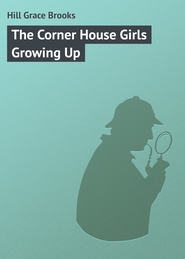По всем вопросам обращайтесь на: info@litportal.ru
(©) 2003-2024.
✖
The Corner House Girls on a Tour
Настройки чтения
Размер шрифта
Высота строк
Поля
“Not me!”
“Well – ” Dot looked all around. There was nobody else in sight just then. Willow Street was quite deserted.
“If you won’t, then I must,” declared the little girl, shouldering the obligation pluckily and starting across the street.
“Aw, Dot! Let him alone,” muttered Sammy.
The young rascal was suddenly startled. He began to wonder what would happen to him if his mother learned that he had been trying to fool Dot Kenway in any such way as this.
“Come back!” he called after her.
“Sha’n’t!” declared Dot, who could be stubborn when she wanted to be.
“Say! that man won’t listen to you,” insisted Sammy.
Dot kept right on. The man had halted, and was clinging to a tree box, his head hanging down. His face was very much flushed and his eyes were glassy.
“But I s’pose,” thought Dot, “if I was carrying a brick in my hat it would make me sick, too.”
“Mister!” she said to the man, stopping in the gutter and looking up at him.
“Huh? What’s matter?” asked the man. His head jerked up and he looked all around to see who had spoken to him.
“Mister,” said Dot, earnestly, “I – I hope you’ll ‘scuse me, but there’s a brick in your hat. Sammy Pinkney says so. And I think if you take it out you’ll feel ever so much better.”
Sammy heard her. He actually grew pale, and, casting a startled glance around him, he ran. He ran all the way home, for he could not imagine what the man would say or do to Dot. Sammy was not a very brave boy.
The unfortunate man looked down at Dot, finally having discovered her whereabouts, with preternatural gravity.
“Say – little girl – say that ’gain, will you?” he said, slowly.
Dot quite innocently repeated it. The man carefully removed his hat and looked into it. Then he turned it over and shook it. Nothing, of course, fell to the ground.
“’Tisn’t there. You fooled yourself. I thought so,” muttered the man.
And then he leaned so far over that he dropped the hat in the gutter.
“You must be dreadful sick,” Dot said to him, her little heart touched by his appearance.
“Yes – that’s it. Sick. That’s it,” he mumbled.
This was a really awful adventure for little Dot Kenway.
“I’m going to get you a glass of water,” she said. “Your face is so red. You are sick, I can see.”
He said nothing, but blinked at her. Perhaps he did not at first quite understand. Dot turned to cross the street toward the store on the corner. Then she turned back.
“Will you please hold my Alice-doll while I go for the water?” she asked the man. “Do be very careful with her – please.”
“Sure!” said the man, good-naturedly.
“You’ll truly, truly be very careful of her?”
“Sure will,” repeated the unfortunate.
So, after she had placed the doll carefully in his arms, the little girl tripped away on her errand of mercy. The man sat down on the curb and held it. It might have been a laughable situation – only no thinking person could have laughed.
The man nursed the doll as tenderly as Dot would have done herself. He rocked to and fro on the curb, hugging the battered doll and looking down at it earnestly.
Nobody had yet noticed the incident – save Sammy Pinkney; and Sammy Pinkney had run away.
Dot was bold in the cause of any one in need, if she was not bold for herself. She asked for the glass of cold water and obtained it. She brought it carefully back to the man on the curbstone, holding the glass in both her dimpled hands.
His face was still very red, but his eyes were no longer glassy. He looked at the child with a shamed expression slowly dawning in his countenance, and his eyes were moist with tears.
“You’d better take your doll, little girl, and get away from me,” he said, but not roughly.
“Oh, no,” said Dot, determinedly. “I must help you. I know you must be very sick. You ought to see our Dr. Forsyth. He could make you well quick, I know.”
“I guess you can cure me as quickly as a doctor,” said the man, hanging his head. “I – I had a little girl like you once.”
“Now drink some of this,” urged Dot, without noticing the man’s last remark, and offering the glass of water.
He took it in a trembling hand and raised it to his lips. The little girl reached for the Alice-doll, but watched him carefully.
“Don’t spill it,” she said, “and don’t drink it all. I think if I put some on your face you’d feel better.”
Immediately she produced a diminutive handkerchief, folded just as it had been ironed, and when she took back the glass, she dipped the bit of muslin in the water remaining in it.
Then with tender hand she wiped his hot face; and she wiped away two big tears, too, that started down his cheeks. She was still engaged in thus playing the Good Samaritan when a swiftly moving motor car coming through Willow Street was suddenly brought to a stop beside them.
There was a thin, wiry fellow at the steering wheel. The goggles he wore half disguised him. In the tonneau sat a fat, prosperous looking man smoking a big, black cigar.
“That’s him, ain’t it, Joe?” asked the fat man, nodding toward the man sitting on the curbstone.
“Yep. That’s him,” rejoined the chauffeur.
“Hey, Mr. Maynard!” exclaimed the fat man. “Get up and get in here. I want to talk to you.”
The fast sobering man looked up, saw the speaker, and did not look particularly pleased. He tried to rise. Although his brain was fast clearing, his limbs were still wabbly.
“Get out and boost him in here,” said the fat man, in a low tone to the chauffeur.
The latter hopped out. He came quickly to the aid of Mr. Maynard, and pushed little Dot Kenway rudely aside. The man still held the doll.
“Say! you don’t want that thing!” muttered the chauffeur, and he seized the doll and flung it disdainfully upon the ground.
Dot uttered a scream of terror. At that moment Agnes and Neale O’Neil, the latter carrying the girl’s schoolbooks, came around the corner.










